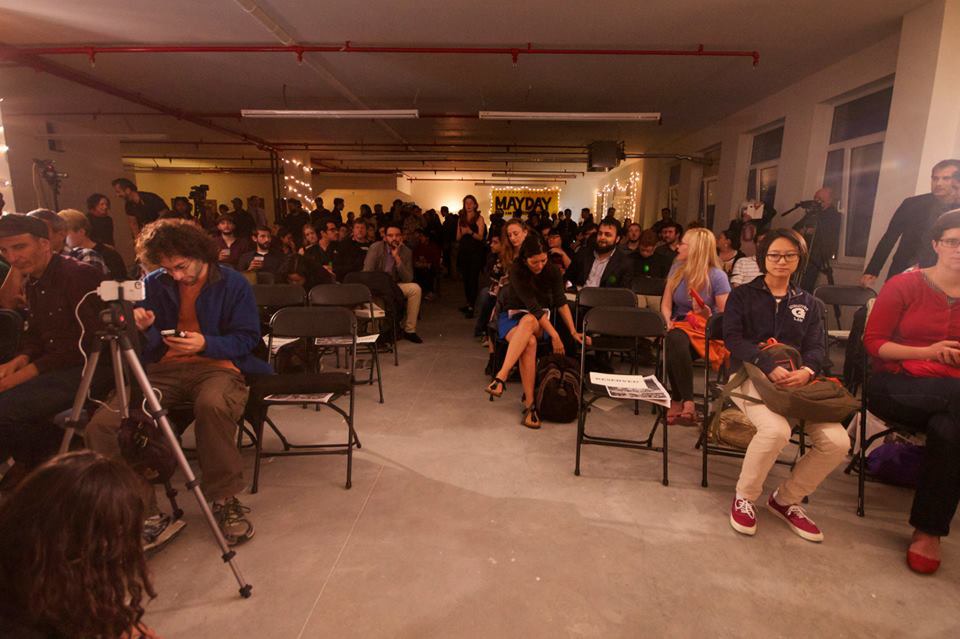
Journalists Jeremy Scahill and Glen Greenwald, together with Academy Award-nominated documentary filmmaker Laura Pointras, spoke to a packed audience Thursday night on the top floor of Bushwick’s Mayday, a newly opened “bar and community space” on Starr street in northern part of the booming North Brooklyn neighborhood.
Jeremy Scahill, author of Dirty Wars and Blackwater.

Ana Noguera, co-founder of the organization and former co-worker with Scahill at Democracy Now, described the soon to be opened bar and cafe on the building’s bottom floor as a “resource for movements”. Described by Scahill as having “the most socialist business plan,” Mayday plans to subsidize rent for activist organizations that rent the buildings’ other floors. As reported by Bedford and Bowery, the organization has already found tenants in Make the Road, a community group which organizes and advocates for low-income immigrant communities and supports workers in local labor disputes, and EcoStationNY, which will operate a farm on the building’s roof.
Those interested in using the space should check out this part of their website.
Laura Pointras, director of the documentary Citizenfour.

As smokers overlooked Starr street below and the Manhattan skyline beyond, John Cook, former editor in chief of Gawker and current editor in chief of the new media project The Intercept, recounted his past ambivalence toward the “professional club” of the journalist community. “I’ve decided to reclaim that term for ourselves,” he explained, before introducing Glen Greenwald.
Greenwald, standing before a mural of a newspaper man blinded by an outstretched hand and an American flag, praised Scahill’s and Poitras’s work for using “the same tactic for overturning the narrative of the endless wars committed by the United States,” which was “rehumanizing those rendered invisible” by administration-sanctioned media releases.

Scahill, author of Dirty Wars and Blackwater, and Poitras, director of My Country, My Country and The Oath among others, spoke after the world premier of the trailer for Pointras’ newest film, Citizenfour. The film, a story of Edward Snowden’s disclosure of the NSA’s surveillance program and his escape from the United States, opens to a limited release on October 24.
Both Pointras and Scahill discussed the difficulties of protecting sources under the Obama administration, which has prosecuted more whistleblowers under the 1917 Espionage Act than all other presidents combined. Though during the Nixon administration the journalism industry laid bare extensive government deception behind the official arguments for the Vietnam War, today analysts and journalists seeking to make public the official conduct of the War on Terror have not found the same forgiveness extended to Daniel Ellsberg in 1971.
Scahill went on to give an animated and sprawling speech addressing everything from Glen Greenwald’s large number of dogs in his home in Rio de Janeiro to the Yo app, before denouncing Kathryn Bigelow for “making films that glorify the war machine.” In a perhaps adrenaline-addled coda, he then briefly recounted the history of American influence and intervention in Iraq.
Nicholas Heyward, father of Nicholas Heyward Jr., who was killed by the police in 1994.

ISIS, Scahill said, was an unintended consequence of American foreign policy against Saddam Hussein, just as Al Qaeda was of American foreign policy against the Soviet Union. A top ISIS military leader, Izzat Ibrahim al-Douri, Scahill explained, was a secular Baathist general of the Iran-Iraq War who was removed from the provisional government under Paul Bremer, the Coalition-installed head of state in Iraq in 2003.
Scahill then voiced a theory that the United States foreign policy was intended to show the world that “the U.S. doesn’t give a fuck” and that “if they can kill this many civilians” in the Middle East, they might do so as well elsewhere.


